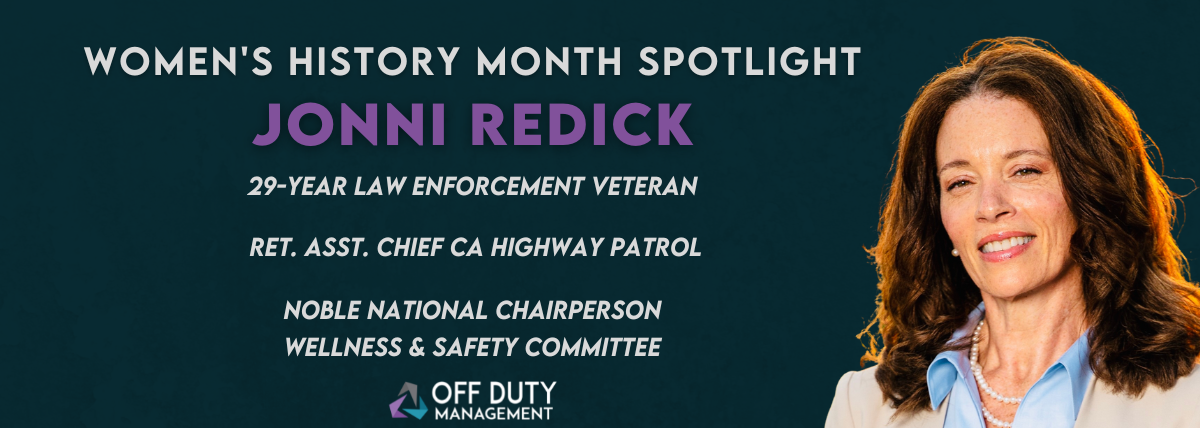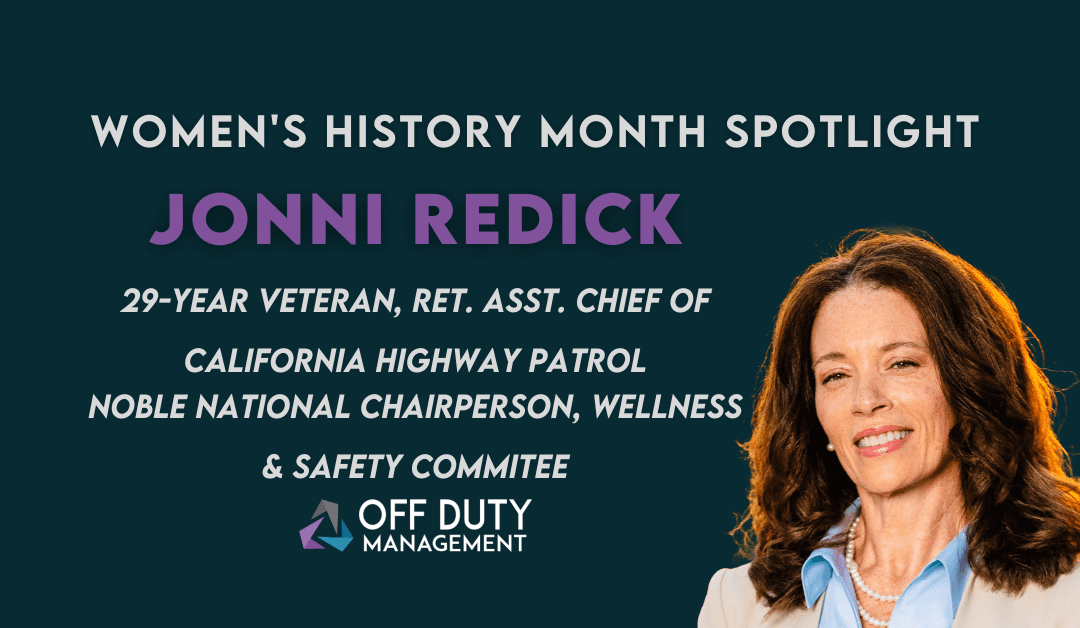
Breaking Down Barriers: Celebrating Women’s History Month with Jonni Redick
As we continue to celebrate Women’s History Month, it’s important to recognize how women, especially women of color, have faced numerous challenges breaking down barriers in the historically male-dominated field of law enforcement. Despite these barriers, there are trailblazers who have paved the way for future generations. One such trailblazer is Jonni Redick, a 29-year veteran of law enforcement with a humble start in the California Highway Patrol (CHP). Jonni overcame numerous obstacles as she rose through the ranks to become an executive leader. Today, Jonni reflects on her journey, the progress she has witnessed for women in law enforcement, and the impact women are making and will continue to make in this field.
The Beginning of Jonni Redick’s Journey
“In December of 1988, I joined the California Highway Patrol with a personal challenge to see if I could do it because almost everyone in my circle, except my mother, who raised me, said I couldn’t do it.” “I had no family members in law enforcement, no one had recruited me, I only had a high school diploma with a few units of junior college, and I was a female of color, so no one was looking at me for police work.” One day while reading a comic strip in the local newspaper sitting across from the comics were the classified ads with a quarter-page advertisement that read “California Highway Patrol – NOW HIRING.” The ad listed the annual salary of “$40,000 a year,” along with the benefits of health, dental and vision insurance. Oh, and secure retirement. “As a 20-year-old that didn’t go to the dentist or doctor often, or have much money, because we were off and on welfare assistance, all of it was very appealing. Plus, I grew up on CHiPs so, who wouldn’t want to patrol along the beach!”
“I am a 29-year veteran, rising through the CHP ranks and breaking through the less-than-one percent ceiling for women of color in executive leadership in law enforcement,” Jonni tells us. “It is incredible to reflect on my journey from a county clerk typist to rising in a multi-billion-dollar law enforcement organization where I oversaw large-scale civil disturbance, and natural disaster response coordination and managed hundreds of personnel within daily operations.”
How have you seen law enforcement change for women since your first day as an officer?
“Looking across the law enforcement landscape, I see the incredible progress in the working in law enforcement. Women are in positions of supervision, management, and executive leadership that I either never saw or they were becoming the first in them. Now, agencies no longer have no women in those positions or ranks; they have more firsts and growing more seconds, thirds, and beyond. I recall sitting at a table with a woman at a woman’s conference last year as we were giving a round of applause for someone who was a first who was up on stage.”
“She was sharing that she was not a first but the sixth woman lieutenant in her agency almost as though it wasn’t enough. The reaction was more subdued than for the first on the stage. From across the table, I asked her how old her agency was, and she said it was established in the late 1800s. Everyone paused, and at the same time, we celebrated her 6th!! All of it matters when we are talking about changing policing culture and the gender role expectations for women who are more than enough for this work.”
In what ways do you think women have made and will continue to make an impact in law enforcement?
“Women are showing up in fierce force to support, encourage and shift the narrative for themselves and other women. This is happening not only through rising through the ranks but in the special assignments they seek that are nontraditional for women in policing. .”
“They are expanding their network to leverage those relationships to reshape policy, practices, and partnerships. Women are bringing their academic brilliance to policing to provide evidence-based research to reframe organizations and lead in a culture of change. Women are writing their history for today every day and that same contemporary history-making will guide future women in law enforcement to continue making history versus just writing it.”
What would you say to a woman considering pursuing a career in law enforcement?
“With any consideration for seeking a career, assess your readiness for the work. It is an amazing career, and it will provide more than you can imagine in meaningful and fulfilling work. But you must assess your emotions and emotional intelligence readiness to provide the quality of selfless service required to give to others on their best and worst days.“
“Once you decide, trust the process of YOUR journey. There will be people who will doubt you, but they are not on your journey. Trusting our journeys requires believing in ourselves and an awareness that there is a process that works and takes time.”
Thank You Jonni Redick!
Thank you, Jonni, for your service, leadership, and for paving the way for future generations of women in this field.

